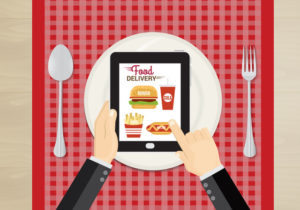Restaurant Accounting Outsourcing – Internet-enabled cloud-based solutions are changing how businesses operate, and an increasing reliance on third-party businesses is resulting in a greater need for reconciliation and integration of data from external parties.
There’s only one constant: change. The integration of the Internet into every aspect of our daily lives has profoundly and permanently changed the public’s buying habits and forced almost every industry to adapt. This revolution has reverberated especially hard in the $70-billion-a-year hospitality and restaurant industries and effected rapid, industry-wide changes.
For years, restaurant owners relied on very little technology: a typical restaurant office desk would be stacked with binders full of notes, stacks of invoices, and piles of receipts that needed to be reconciled. Marketing outreach consisted of local radio and newspaper ads. Technology was expensive and required time for training, two items in short supply in an industry known to have razor-thin margins and high turnover.
To meet that need, restaurants are spending on average 2.5% of their revenue on technology. And most participants indicated that they plan to increase their spending by 1-5%, according to Hospitality Technology Magazine’s 2016 Restaurant Technology Study. The rise of third-party Internet cloud-based technologies, namely online ordering apps and complete online ordering and delivery services, is a good example of how the Internet is allowing business to become more collaborative and increasing restaurants’ reliance on third-party businesses to grow their own business.

Consumers, accustomed to online ordering in almost every aspect of their lives, have responded enthusiastically to cloud-based apps that allow them to order food online. A recent article in the New York Post, “That awesome delivery restaurant you love doesn’t actually exist,” talks about the rise of food delivery businesses that sound like restaurants on social media but are actually “ghost restaurants”: delivery-only businesses with no storefront and no dine-in option. In many areas, restaurant consumers have their food ordered and even seamlessly delivered from third-party delivery services, such as Amazon, UberEats, and Postmates. The trend has become so ubiquitous that restaurateurs have coined a name for it: disappearing walls.
Restaurants are Outsourcing Order and Delivery Management Services
As a result, restaurants are finding that they must invest in technology to directly interact with consumers as well as the delivery businesses, which has led to increased accounting work trying to keep track of revenues and expenses of their own and third parties.
 The marketing from purveyors, such as UberEats, Postmates, and GrubHub, is seductive, promising to expand a restaurant’s volume by 10-20%, and delivering customers that might not come into their store due to the distance from their office or residence or a lack of time. Restaurants in shopping malls, seeing the slowing of foot traffic, are eager to find new customers. Simply being listed on a third-party delivery system’s app gives a marketing boost to restaurants that may not have a budget for such expenses. In addition, GrubHub says that restaurants using its service will be more efficient; claiming that its online ordering platform will cut order processing time to 45 seconds, versus two minutes for a phone call. They also offer technology and support to manage the flow of delivery orders from a restaurant’s tablet, phone, or computer and the ability to monitor orders with real-time GPS tracking.
The marketing from purveyors, such as UberEats, Postmates, and GrubHub, is seductive, promising to expand a restaurant’s volume by 10-20%, and delivering customers that might not come into their store due to the distance from their office or residence or a lack of time. Restaurants in shopping malls, seeing the slowing of foot traffic, are eager to find new customers. Simply being listed on a third-party delivery system’s app gives a marketing boost to restaurants that may not have a budget for such expenses. In addition, GrubHub says that restaurants using its service will be more efficient; claiming that its online ordering platform will cut order processing time to 45 seconds, versus two minutes for a phone call. They also offer technology and support to manage the flow of delivery orders from a restaurant’s tablet, phone, or computer and the ability to monitor orders with real-time GPS tracking.
Many restaurant owners feel that the third-party partners are worth the expense. For many, the fees are worth the ability to offer delivery without having to hire drivers, or to be responsible for payroll and benefits. Many restaurant owners also feel that with high fixed costs and the low variable costs of these delivery orders, every additional order goes straight to the bottom line and helps improve the return on the initial capital investment and staff (who are working anyway). And these added consumers are a potential audience for future promotions that may bring them into the restaurant.
However other restaurant owners feel the benefits of third-party delivery can come at a steep price point for restaurants. The current business model has transferred the costs from the customer to the restaurant. While customers are generally charged $5 per order at UberEats and Postmates, and Amazon is offering free delivery to Prime members, in many cases restaurants are paying fees to third party services of 20 to 30%. Some restaurants have opted to remove their businesses from online delivery services, citing high costs, concerns about how their brand is represented to their clients by a third party, as well as how their food is treated in transit.
A key challenge in this collaborative B2B economy is tracking the revenue and costs generated by a third-party business and integrating them into a company’s accounting system. Without accurate data and timely financial reporting, the advantages or disadvantages of embracing this new technology may not be clear. CFOs and restaurant owners need complete, up-to-date financial metrics on how outsourcing, and more specifically, these third-party partners are affecting the business’s bottom line. And they will need it in real time to make efficient and successful business decision on the fly.
Restaurant Accounting Outsourcing – Your In-house Accounting Services May Not be Ready for B2B
Many companies have realized that the additional complications of B2B, while they have the potential to add to the bottom line, have stretched their current accounting practices to the limit. Increasingly they are feeling that they need additional support for the role B2B has carved out in their company. They may be concerned about accounting for the costs of the new service, either through modification of existing systems or through manual tracking and reconciliation and tracking procedures.
“A lot of companies start off small and have accounting departments that are appropriate for that size company. Then the company takes off but their accounting departments never really keep pace with the growth. They can handle the work for a while, but the cracks really start to show when you add in new factors, such as a third-party business,” says Ken Johnson, Vice President for Development at IQ BackOffice, a leader in accounting outsourcing.
And do these services justify the investments in time and money? And what types of technology will firms need to measure the returns on these partnerships?
Innovative Restaurant Accounting Outsourcing Services May Be the Answer
One IQ BackOffice client, a multi-unit Denny’s franchisee, experienced a surge in online ordering through third-party delivery. They were delighted with the growth in business, but not so much with the manual reconciliation of the third-party activity. After a period of research, they decided that outsourcing their accounting department was the best path for their company and engaged IQ BackOffice. The client was drawn to IQ BackOffice’s years of outsourced accounting service and business process re-engineering expertise.
IQ BackOffice re-engineered their current processes and accounting systems based on accounting best practices. IQ determined how to best integrate processing (capture and reconciliation) from the client’s business and business partners on a daily basis. IQ BackOffice used a combination of Archimedes, their proprietary enterprise cloud-based process management system, and Intacct, a cloud-based accounting software that is robust enough to meet clients’ complex accounting needs. IQ BackOffice streamlined existing business processes by using technology and best practices to integrate data from multiple systems and sources on a daily basis, shortening the close from ten days to five and eliminating 99% of errors. IQ Back Office automated detailed accurate coding of transactions, making it easier for restaurant management to have accurate and timely financial data, allowing them to more efficiently run their businesses.
The re-engineered system included daily validations and reconciliations of revenues and receipts using point of sale systems data and daily booking of financial activity to the accounting system. Daily practices ensure that the online financial reports are up to date when restaurant management wants to review them. “Our goal is to provide our clients with detailed reporting to support informed business decisions. Using Intacct, we are able to provide exceptional reporting. Clients are blown away by the level of dashboard reporting and KPIs we offer. It’s the wow factor. A lot of clients are coming off of old solutions where they were scrambling to simply accumulate their financial data and didn’t have immediate online access to up-to-date information like they do with our solution,” says Johnson.
Effective Restaurant Accounting Outsourcing Services Can Save Money and Improve Reporting Accuracy
The bottom line? The Denny’s franchisee has saved money, and their reporting has become more accurate and more timely. They can literally pull up a report anytime they are connected to the Internet using any device. With the faster, more detailed reporting they can see the costs and financial benefits of working with a third-party business.
Restaurant Accounting Outsourcing owners need to carefully look at third-party services and pick the one that best suits their restaurant and can deliver the most significant volume of daily orders. And they should consider innovative and collaborative accounting providers, such as IQ BackOffice, to partner with them. “Clients are sold on our experience as an accounting services provider and our ability to provide them with comprehensive support, starting with accounts payable all the way through financial reporting,” explains Johnson.
Johnson also noted that the firm has seen increased interest from restaurant and hospitality businesses working in the B2B economy. “We have a lot of clients in these markets and they are experiencing immense value in terms of cost and time savings,” he stated.
For more information, contact:
Ken Johnson
(310) 322-2311
extension 1017
ken@iqbackoffice.com
2121 Rosecrans Avenue, Suite 3350
El Segundo, CA 90245




